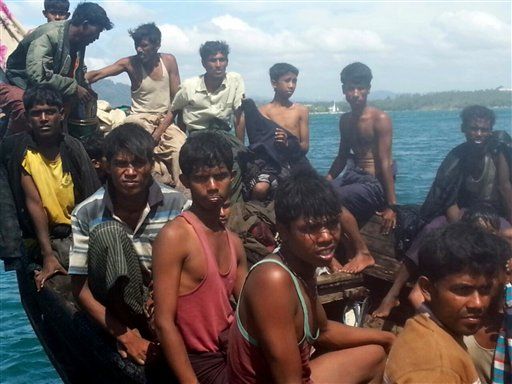Thailand called on Friday for concerted action to tackle “irregular” migration in the Indian Ocean, but no substantial solutions emerged from a regional meeting aimed at preventing this year’s “boat people” tragedies in which hundreds drowned.
Representatives from Southeast Asian countries met in Bangkok to hash out a framework to deal with tens of thousands of migrants, most from Burma and Bangladesh, who make perilous voyages across the Bay of Bengal and Andaman Sea every year.
The meeting ended with a plan put forward by Thailand which five directly affected countries, Indonesia, Malaysia, Thailand, Burma and Bangladesh, would consider.
“There is still no clarity. We have discussed but not agreed,” said Apichart Chinwanno, the permanent secretary at the Thai Foreign Ministry.
The document being considered, as European countries struggle to cope with refugees fleeing war in Syria and Iraq, focused on protection of migrants, prevention of irregular migration and prosecution of human smuggling and trafficking networks, he said, but gave few details.
“They focused on an information campaign, that’s all. Not about helping people at sea and not about humanitarian assistance,” said a UN official, who declined to be named, told Reuters.
Foreign Minister Don Pramudwinai said the region needed “an explicit and efficient mechanism to manage and control the negative impacts of irregular migration”.
[related]
The conference was the second round of talks that were launched in May amid a migration crisis prompted by a human trafficking crackdown in Thailand.
The crackdown caused traffickers to abandon 4,000 migrants from Burma and Bangladesh at sea and was marked by a chaotic spectacle of “maritime ping-pong” as the Thai, Malaysian and Indonesian navies repeatedly pushed desperate migrants in boats away from their waters.
October and November mark the start of the four-month “sailing season”, the busiest time for smuggling and trafficking ships plying the Bay of Bengal.
While some migrants are Bangladeshis escaping poverty at home, many are members of Burma ‘s 1.1 million Rohingya Muslim community who live in apartheid-like conditions in the country’s Arakan State.
Burma does not consider the Rohingya citizens, rendering them effectively stateless, while denying it discriminates against them or that they are fleeing persecution.
The foreign minister had said the issue of Rohingya citizenship would not be discussed on Friday.
Read more about Burma’s Rohingya Muslim minority here.



